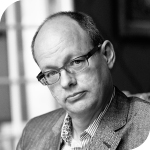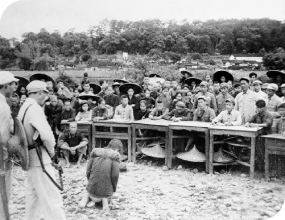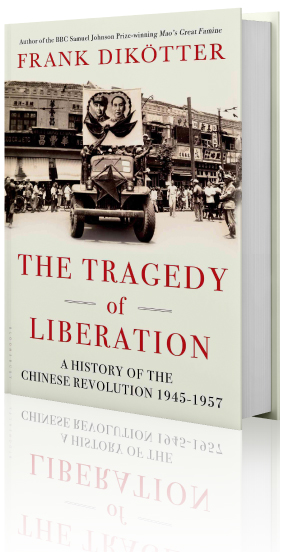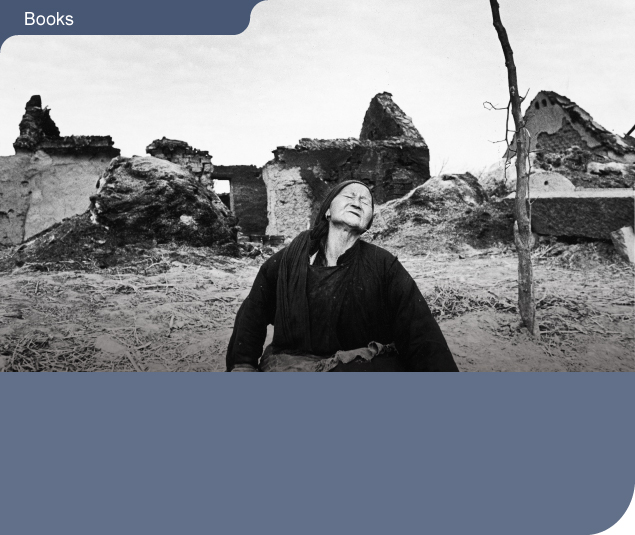Mao Zedong famously proclaimed that “a revolution is not a dinner party... [it] is an insurrection, an act of violence in which one class overthrows another.” The Tragedy of Liberation: A History of the Chinese Revolution 1945–1957, a new book by Chair Professor of Humanities Frank Dikötter which has recently been shortlisted for the Orwell Prize, vividly illustrates what that has meant on the ground.
Professor Dikötter has dug deep into county and provincial archives and, similar to his previous work, Mao’s Great Famine, which won the 2011 BBC Samuel Johnson Prize for Non-Fiction, he has written a history about people of all walks of life and their experiences of liberation.
The first years under Communist Party rule was characterised by violence and random denunciations, all signposting the atrocities to come during the famine and the Cultural Revolution.
“These early years were not so much the golden age that even some critics of communism have portrayed, but rather one of systematic violence and calculated terror,” he said.
“Take the example of land reform. I no longer call it land reform because land was distributed in Japan, Korea and Taiwan during precisely the same years, about 1947–1952, without a drop of blood having been shed. Whereas in the People’s Republic of China (PRC), when ‘land reform’ starts all the way up north in 1947 and gradually unfolds with the conquest of the country by the Communists, it leads to 1.5 million to 2 million people losing their lives.”

It seems to me that the Government wanted everyone in the villages to have blood on their hands, everybody had to participate in these mass denunciation meetings so all of them would be afraid of the return of the old order.
Professor Frank DikötterKilling quotas and denunciations
In 1950 the Party prescribed an arbitrary ‘killing quota’ of one per 1,000 people, to eliminate spies, counterrevolutionaries, landlords and other enemies of the regime. Some provinces decided to go one better and raise their quotas. In Guizhou they killed three per 1,000.
 An alleged landlord facing a People’s Tribunal minutes before being executed by a shot to the back in a village in Guangdong in July, 1952.
An alleged landlord facing a People’s Tribunal minutes before being executed by a shot to the back in a village in Guangdong in July, 1952.
Denunciations were actively encouraged regardless of the age or background of targets or the evidence. In Yunnan, an anonymous denunciation that resulted in children as young as eight being arrested was overturned a year later by the Party. In Guangdong about one-third of those persecuted were later declared to be innocent.
“That must surely qualify not just as violence but as terror in the sense that it is not carefully targeted but it is blind. It can hit anybody at any time,” Professor Dikötter said.
Most of the executions were carried out in public and many people were at some point pressured or coerced to watch them, even to participate in them, thus binding their fate to the Party.
“It seems to me that the Government wanted everyone in the villages to have blood on their hands, everybody had to participate in these mass denunciation meetings so all of them would be afraid of the return of the old order. Once they had been implicated in the ritual murder of a few, they were tied to the Communist Party,” he said.
“These are not discrete episodes. They are part of a cycle of violence. Liberation, the Great Leap Forward, the Cultural Revolution, all of it is intrinsically linked. People know each other in these villages and memories go all the way back to the founding years of the PRC. Of course it’s also a self-fulfilling prophecy. The more the state represses, executes or sends people to the gulag, the more opponents it creates. So when it says it’s constantly fighting counterrevolutionaries, it’s probably true. The Party becomes afraid of its own shadow.”
The tragedy itself

The period is also marked by what Professor Dikötter sees as its most disturbing legacy: the curtailment of basic freedoms and dismantling of civil society as the Party moves to control most aspects of people’s lives, even their thoughts as adults are sent to evening classes to learn the new orthodoxy and become what the regime called ‘New People’. By 1957 people are compelled to examine not only their own thoughts but those of family members, and denounce them if necessary.
“Whether or not the Great Leap Forward or the liberation of China was carried out with the best of intentions, as some claim, ultimately doesn’t really matter. What matters is that once you start restricting basic freedoms, it has all sorts of unintended side effects. The tragedy of liberation is that everything was subsumed by the state in the name of the greater good.”
His next book will look at the Cultural Revolution. “I’m glad I am doing it this way because I cannot see how you can write about the Cultural Revolution without understanding not only those foundation years but Mao’s Great Famine as well,” he said.■


